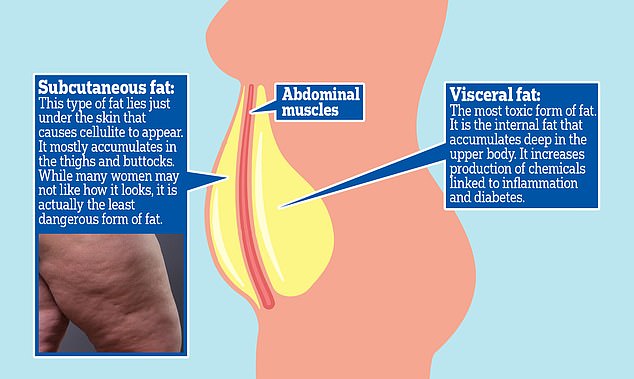A ‘middle-age’ spread or a beer belly could indicate you’re more likely to develop Alzheimer’s disease within the next 20 years, a study suggests.
US researchers found that people with more visceral fat, the fat that forms around vital organs such as the heart, stomach and liver, had more abnormal proteins in the brain that are characteristic of Alzheimer’s disease.
The disease is the leading cause of dementia in the US, where almost seven million people suffer from it, and in Britain, where almost a million people suffer from it. The brain disorder deprives suffer from their memory and independence.
But the researchers said their discovery could be cause for hope.
They said linking Alzheimer’s risk to visceral fat levels in people in their 40s and 50s meant that interventions such as diet and exercise to slim it down could have a huge impact on dementia decades later.
Visceral fat, also called ‘lean fat’, differs from other types of fat because it wraps around the organs and in some cases makes little difference to their body mass index (BMI).
This means that even people with a healthy BMI can be at risk. However, in most cases, especially in men, the fat presents itself as a beer belly and settles around the middle.
In the study, presented at the annual meeting of the Radiological Society of North America, researchers looked at health data from 80 people in their 40s and 50s with normal cognitive skills, meaning they currently had no signs of dementia.
Hidden spread in middle age could indicate you’re more likely to develop Alzheimer’s disease 20 years later, a study suggests

Former Deputy Prime Minister John Prescott (pictured in 2012) has died aged 86, his family has said

Visceral fat wraps around abdominal organs deep within the body, while subcutaneous fat is located under the skin. Even people with a healthy BMI can have a significant amount of visceral fat
Of the study participants, just over half were obese and all underwent scans of their bodies to detect visceral fat and scans of their brains to detect amyloid proteins linked to Alzheimer’s disease.
The results showed that higher levels of visceral fat were linked to increased amyloid proteins.
Although obesity has previously been found to pose an increasing risk of dementia, the researchers calculated that visceral fat contributed to 77 percent of obesity-related amyloid buildup in the brain.
Dr. Mahsa Dolatshahi, a research associate at Washington University School of Medicine in St. Louis, Missouri and author of the paper, said they studied the first to determine this connection.
“To our knowledge, our study is the only one to demonstrate these findings in middle age, when our participants are decades away from developing the earliest symptoms of the dementia that results from Alzheimer’s disease,” she said.
‘This crucial result was discovered because we examined the pathology of Alzheimer’s disease as early as mid-life – in the 1940s and 1950s – when the disease pathology is in its earliest stages and potential changes such as weight loss and reduction visceral fat may be more effective as a means of reducing disease. preventing or delaying the onset of the disease,” she said.
Nearly one million Britons are believed to suffer from dementia, with around one in fourteen people over the age of 65.

Not being able to learn new tasks and struggling to stay focused on a single task could be a sign of dementia – the memory-robbing disorder that affects almost 1 million Britons and seven million Americans
However, this figure is predicted to rise to almost 1.5 million in the coming decades as the population continues to age.
The disorder is estimated to cost the country £43 billion a year, a bill expected to double by 2040.
Former Deputy Prime Minister and Labor MP and peer John Prescott died late last month after a battle with Alzheimer’s disease.
Experts say a good way to measure visceral fat is to have a waist circumference of 32 inches (80 cm) or more for women, and 36 inches (94 cm) more for men.

